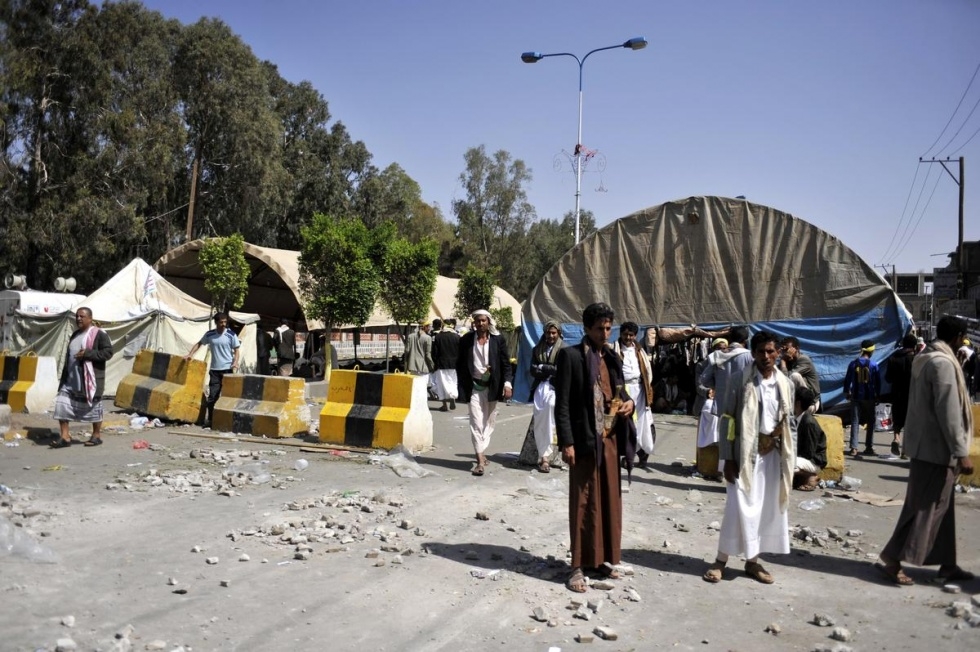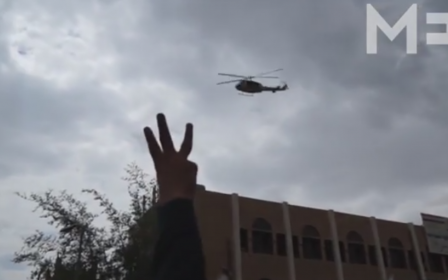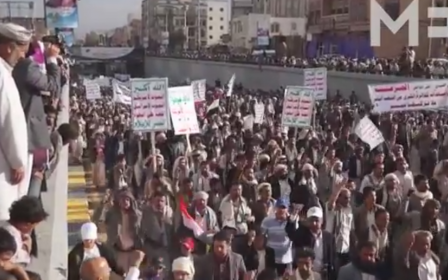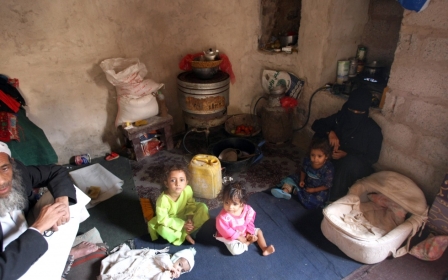Houthi rebels besiege Yemen's capital
Anti-riot police used tear gas and used water cannons to disperse thousands of Houthis who were blocking roads to Sana'a airport and staging sit-ins

Yemen's Houthi protestors have set up tents, completely blocking traffic in front of the Ministry of Electricity and Energy on the road that leads to Sanaa Airport (AA)
Published date: 12 February 2015 23:15 GMT
|
Last update: 9 years 9 months ago
SANA'A - Houthi rebels in Yemen announced on Sunday that they were taking the capital by siege in response to the killing of two of their supporters in camping sites near Sana'a International Airport.
In an announcement aired on the official Houthi station, Al Masirah TV, rebels said that a large number of protesters on the outskirt of Sana'a planned to prevent government vehicles from entering or leaving the capital.
Tension raged in Yemen on Sunday when anti-riot police used tear gas and used water cannons to disperse thousands of Houthis who were blocking roads to Sana'a airport and staging sit-ins outside many ministries. The airport and ministries are located in different areas.
The Houthis said that tens of their supporters were treated for breathing problems as a result of inhaling tear gas. The police failed to break up the protest.
The government denied that it used lethal force against the protesters, saying that police had told the protesters to evacuate the roads and ministries beforehand.
In a statement on the state-run Saba news agency, the Supreme Security Committee said that police resorted to using water cannons when the Houthis refused to leave their positions. The committee, which is headed by the country's president Abd Rabbuh Mansur Hadi, said that the
Houthis blocked the roads to the airport and camped outside ministries of electricity and communication, forcing workers to leave their offices.
Thousands of Houthi supporters have been camping out in the streets and the outskirts of the capital since 18 August when their leader, Abdul Malik Al Houthi, urged them to protest against the government and its economical policies. Al Houthi said that the protesters would stay put until the government resigns and controversial fuel subsidies are reinstated.
Mohammad Abdulsallam, the spokesperson for the group, threatened to take arms and fight the police if they continued attacking their supporters.
We stress on the right of our people to self-defence with all means if the “government persisted in its aggression” Abdulsallam said in a statement on his Facebook page on Sunday. Abdulsallam said in the statement that Yemeni soldiers had defected from the army.
We reiterate our calls to the remaining army soldiers and security to follow their peers “who announced their support to [the] revolution” his statement said.
On 6 August, Hadi reiterated his warnings to the Iranians to stop meddling in Yemeni affairs by supporting the Houthi rebels, saying that Iran should judge reason and logic “and deal with all Yemenis, not certain groups and sects”, referring to the Houthis.
International support
Official media have reported that many countries and international organisations have expressed their support for Hadi's initiative to defuse tension in the country. Saba said that Americans, Saudis and the other members of Gulf Cooperation Council affirmed their support for Hadi.
Last week, the United Nations security council urged the Houthis to stop derailing the transitional process in the country and end hostilities in the capital and the provinces of Amran and Jawf.
The security council reaffirmed its support for President Abd Rabbuh Mansur Hadi in “urging the Yemeni authorities to expedite the process of reforms, including army and security sector reform,” the council said in a statement.
In an attempt to quell the rebels' protests, Hadi agreed to dismiss the government, review fuel subsidies and approve measures to curb corruption. But the rebels rejected the decision and vowed to mount pressure until their demands of fully resorting fuel subsidies and implementing the outcomes of National Dialogue Conference are met.
But as tension are rising, local media outlets reported on Sunday that the mayor of Sana'a, Abdul Gader Ali Hilal, managed to make a breakthrough in his three days of talks with the Houthi leader in the province of Saada.
Al Oula daily said that Hilal came back to Hadi with a proposal from the Houthis, including slashing YR1000 ($US4.7) from prices of 20-litres container of regular gasoline; a first stage that is to be followed by another YR500($US2.33). The newspaper said that Hadi is “likely” to accept the proposal since he was aware of Hilal's mission in the first place.
As some observers in Yemen maintain that the country is teetering on a conflict between government and the rebels, and others think that the showdown is inevitable and “necessary” to curb the expansion of the Houthis in the country. Najjeb Gallab, a political analyst, told Middle East Eye that Hadi should act now.
"Hadi should exercise his power to put an end to the language of tyranny, exploitation and arrogance. People dream of building a state. Iran is trying to undermine theYemeni state by encouraging militias" Gallab said.
New MEE newsletter: Jerusalem Dispatch
Sign up to get the latest insights and analysis on Israel-Palestine, alongside Turkey Unpacked and other MEE newsletters
Middle East Eye delivers independent and unrivalled coverage and analysis of the Middle East, North Africa and beyond. To learn more about republishing this content and the associated fees, please fill out this form. More about MEE can be found here.




